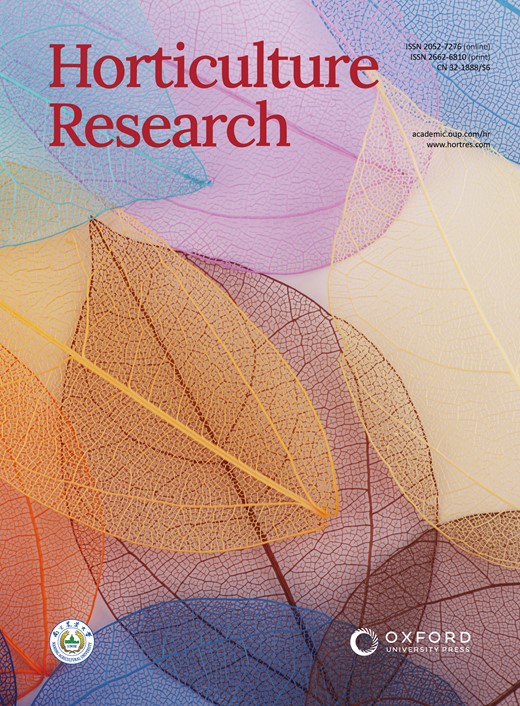CsSPX3-CsPHL7-CsGS1/CsTS1 module mediated pi-regulated negatively theanine biosynthesis in tea (Camellia sinensis)
IF 8.7
1区 农林科学
Q1 Agricultural and Biological Sciences
引用次数: 0
Abstract
Phosphorus (P) is the macronutrients essential for the development and growth of plants, but how external inorganic phosphate (Pi) level and signaling affect tea plant growth and characteristic secondary metabolite biosynthesis are not understood. Theanine is major secondary metabolites, and its contents largely determine tea favor and nutrition qualities. Here, we found theanine contents in tea leaves and roots declined as Pi concentration increased in tea plants after Pi feeding. The transcriptome analysis of global gene expression in tea leaves under Pi feeding suggested a wide range of genes involved in Pi/N transport and responses were altered. Among them, CsSPX3 and CsPHL7 transcript levels in response to Pi feeding to tea plants, their expression patterns were generally opposite to these of major theanine biosynthesis genes, indicating possible regulatory correlations. Biochemical analyses showed that CsSPX3 interacted with CsPHL7, and CsPHL7 negatively regulated theanine biosynthesis genes CsGS1 and CsTS1. Meanwhile, VIGS and transient overexpression systems in tea plants verified the functions of CsSPX3 and CsPHL7 in mediating Pi-feeding-repressed theanine biosynthesis. This study offers fresh insights into the regulatory mechanism underlying Pi repression of theanine biosynthesis, and the CsSPX3-CsPHL7-CsGS1/CsTS1 module plays a role in high Pi-inhibition of theanine production in tea leaves. It has an instructional significance for guiding the high-quality tea production in tea garden fertilization.CsSPX3-CsPHL7-CsGS1/CsTS1 模块介导的茶叶中负茶氨酸的生物合成
磷(P)是植物生长发育所必需的宏量营养元素,但外界无机磷酸盐(Pi)水平和信号如何影响茶树生长和特征次生代谢物的生物合成尚不清楚。茶氨酸是主要的次生代谢产物,其含量在很大程度上决定了茶叶的品质和营养。在此,我们发现茶叶叶片和根中的茶氨酸含量随着茶树摄入 Pi 后 Pi 浓度的增加而下降。通过对茶叶全基因组表达的转录组分析,我们发现参与 Pi/N 转运和响应的多种基因发生了改变。其中,CsSPX3 和 CsPHL7 的转录水平在茶树摄入 Pi 后的响应中,其表达模式与主要茶氨酸生物合成基因的表达模式基本相反,表明可能存在调控相关性。生化分析表明,CsSPX3 与 CsPHL7 相互作用,CsPHL7 负调控茶氨酸生物合成基因 CsGS1 和 CsTS1。同时,在茶树中的 VIGS 和瞬时过表达系统验证了 CsSPX3 和 CsPHL7 在介导 Pi-饲料抑制的茶氨酸生物合成中的功能。该研究为Pi抑制茶氨酸生物合成的调控机制提供了新的见解,CsSPX3-CsPHL7-CsGS1/CsTS1模块在高Pi抑制茶叶茶氨酸生产中发挥了作用。这对指导茶园施肥生产优质茶叶具有指导意义。
本文章由计算机程序翻译,如有差异,请以英文原文为准。
求助全文
约1分钟内获得全文
求助全文
来源期刊

Horticulture Research
Biochemistry, Genetics and Molecular Biology-Biochemistry
CiteScore
11.20
自引率
6.90%
发文量
367
审稿时长
20 weeks
期刊介绍:
Horticulture Research, an open access journal affiliated with Nanjing Agricultural University, has achieved the prestigious ranking of number one in the Horticulture category of the Journal Citation Reports ™ from Clarivate, 2022. As a leading publication in the field, the journal is dedicated to disseminating original research articles, comprehensive reviews, insightful perspectives, thought-provoking comments, and valuable correspondence articles and letters to the editor. Its scope encompasses all vital aspects of horticultural plants and disciplines, such as biotechnology, breeding, cellular and molecular biology, evolution, genetics, inter-species interactions, physiology, and the origination and domestication of crops.
 求助内容:
求助内容: 应助结果提醒方式:
应助结果提醒方式:


